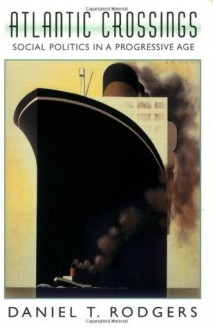
Over a decade after its highly lauded publication I still have not entirely made up my mind as to how I feel about this book. On the one hand, it is intelligent, interesting, and for the most part well-researched. On the other hand, there are some pretty significant errors and omissions.
To begin with the most glaring: Rodgers' underlying chronological supposition concerning transatlantic communication is mistaken. He asks how and why a transatlantic intellectual discourse grew up towards the end of the 19th century, and answers this question with the growth of progressivism, relating the “new” discourse to the social and political changes of the 1890s.
In fact, transatlantic intellectual discourse had been solidly in place well before the period of Rodgers study. Anyone who has studied 19th-century intellectual life could have pointed this out to Rodgers, whose area of specialization is the 1920s. Presumably neither he nor the publisher sought feedback in this area, which is a great pity.
However, if your area of interest is progressive movement after the First World War, its ideas and influences, and the root causes are less important to you, Rodgers' analysis of these elements is useful and intelligent. It is also perhaps timely, as Rodgers' sees American progressives as looking to Europe for ideas and models in a period of “rapid intensification of market relations... and the rising working-class resentments” (59).
Interestingly, one of Rodgers contentions is that a difficulty faced by American progressives was not in finding models in the first place, but in finding many and having to choose between them. They wanted, to put it very generally, to find a path of moderation between the “rocks of cutthroat economic individualism and the shoals of the all-coercive statism” in time to prevent the rise of working class socialism. The debate in these circles included labor regulation (minimum wage, maximum hours, et al), urban planning, and social insurance.
After WWI, in contrast, the exchange of ideas between Europe and the US became more even, especially after the New Deal, which many progressives viewed as the gathering up and culmination of ideas from both sides of the Atlantic. Rodgers argues convincingly that this period and its ideas and political actions were of lasting influence in the US and many European nations.
Even for those interested in the late 19th century there is material of value here, although it less original in its research. Rodgers discusses sociological tourism (largely but not uniquely American), using the most famous example of Jane Addams multiple visits to Toynbee Hall and W.E.B. Dubois' study of German Kathedersozialisten. He returns to this theme in the 1930s with the Lewis Mumford and Catherine Bauer's investigation of housing reform and modern architecture in Germany and Austria. There are also excellent, if not precisely stimulating, examinations of experimental reform attempts in the area of mapping, railway ownership, agrarian reform, mortgages, and, probably best known of these, the Farm Loan Act of 1916.
Other chapter topics: the Paris Exhibition of 1900 and its Musee Social, American students in Germany, municipalization (i.e. the contests over civic versus private ownership of utilities), “war collectivism,” agrarian cooperatives, rural reconstruction, and William Beveridge's plans for postwar reconstruction in Britain. That's just an overview; we also get sanitary improvements, slum clearance, public baths, urban gardening, pensions, health insurance, the role of unofficial* policy advisers, mutual benefit societies – all of which, of course, varied greatly from one place to another.
*Oddly, Rodgers doesn't make much mention of official ones, i.e. those who actually employed by the government or universities to study these questions. It is all philanthropists and philosophers for him. People like Edgar Sydenstricker, Milbourn Lincoln Wilson, and Lewis Cecil Gray don't figure into his chart, although they were essential providers of communication and sponsorship.
Another odd omission is the issue of American nativism. Many historians, such as Harry Marks, would argue that this was a major factor in the failure of Progressivism in the 1920s. I expect legal historians would also debate his minimalist reading of the role of the courts in this process.
There are far more books on this subject than I can list here, but a few suggestions for further reading:
The Emergence of the Welfare States
The State and Economic Knowledge: The American and British Experiences
Social Scientists And Farm Politics In The Age Of Roosevelt
States, Social Knowledge, And The Origins Of Modern Social Policies
Carroll Wright and Labor Reform: The Origin of Labor Statistics
Transnational History
British Social Reform and German Precedents: The Case of Social Insurance 1880-1914
Municipal Services and Employees in the Modern City: New Historic Approaches


 Log in with Facebook
Log in with Facebook 










